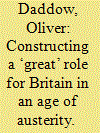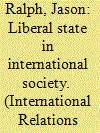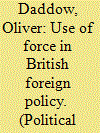| Srl | Item |
| 1 |
ID:
141730


|
|
|
|
|
| Summary/Abstract |
This article interprets the ideational underpinnings of the British Conservative–Liberal coalition government’s foreign policy from 2010 to 2015. It uses qualitative discourse analysis of speeches, statements and policy documents to unpack the traditions of foreign policy thought which informed some of the key foreign policy practices of the coalition government. The analysis centres on the British identity constructed by liberal Conservatives, and the values and interests flowing from this baseline identity that the government’s foreign policy sought to express through its foreign policy. Liberal Conservative foreign policy is argued to have been an attempt to come to terms with the limits on Britain’s international agency in the face of three major foreign policy dilemmas: the legacy of the New Labour years, dramatically reduced economic resources in the ‘age of austerity’ and an increasingly restricted capacity for Britain to exercise ideational entrepreneurship in the international community. The article substantiates the claim in the extant literature that liberal Conservatism significantly adapted but did not restructure an established British foreign policy tradition of merging values and interests in complex ways.
|
|
|
|
|
|
|
|
|
|
|
|
|
|
|
|
| 2 |
ID:
129808


|
|
|
|
|
| Publication |
2014.
|
| Summary/Abstract |
The question of who decides when a state has not met its international responsibilities (and therefore forfeits the right to non-intervention) and what kind of international action should be taken (from limited intervention to full-blown regime change) divides liberal foreign policy thinking. To understand the nature of that division, and what is at stake, this article distinguishes 'neoliberal' from 'liberal internationalist' approaches and locates them in an English School understanding of international society. Where the latter stresses the importance of observing the procedural norms centred on the United Nations, the former contests the legitimacy of such norms if they fail to deliver substantive liberal outcomes. The article then interprets British foreign policy discourse either side of the 2003 Iraq conflict through the prism of this debate. The central claim is that a more cautious approach to the use of force and American unilateralism has not silenced the critique of the UN system and that the international reaction to the Libyan intervention prompts the kind of reflection that continues to separate neoliberal from liberal internationalist approaches.
|
|
|
|
|
|
|
|
|
|
|
|
|
|
|
|
| 3 |
ID:
122472


|
|
|
|
|
| Publication |
2013.
|
| Summary/Abstract |
This article studies the ideational underpinnings of the UK Coalition government's 'liberal conservative' foreign policy. It begins by suggesting that an Iraq-centric account of Blair's foreign policy suggests a grand vision on the prime minister's part that was lacking from his earlier foreign policy adventures, which relied on a more conventional form of British statecraft. The second section contends that the Gordon Brown years 2007-10 and, since the end of New Labour, Coalition foreign policy, can be seen as a response both to the substance and style of Blair's highly personalised stewardship of foreign policy post-9/11. The war on terror and the invasion of Iraq were accompanied by a seemingly open-ended democracy promotion around the globe which was quite out of character with past British practice. The article argues, therefore, that under Brown and Cameron cautious pragmatism has tended to win out over the proclamation of grand strategic ambition.
|
|
|
|
|
|
|
|
|
|
|
|
|
|
|
|